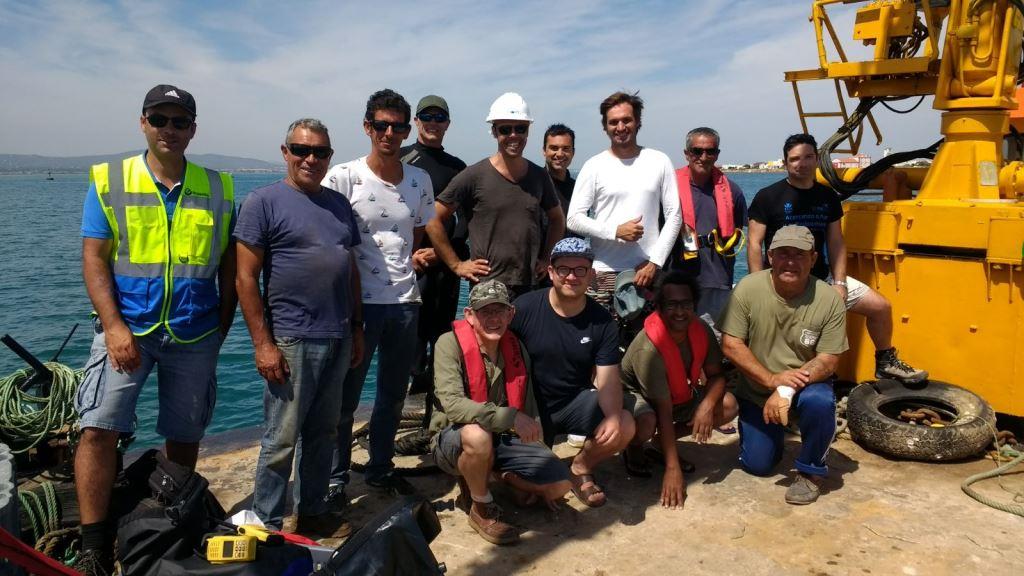 Researchers from the University of Algarve (UAlg) installed, for the first time in Portuguese waters, a device for extracting energy from tidal currents, in the vicinity of the bar. Faro-Olhão, in an operation that took place from the 6th to the 8th of June.
Researchers from the University of Algarve (UAlg) installed, for the first time in Portuguese waters, a device for extracting energy from tidal currents, in the vicinity of the bar. Faro-Olhão, in an operation that took place from the 6th to the 8th of June.
Leading this initiative was the research team of the SCORE project – Sustainability of Energy Production from Tide Currents in Ria Formosa, coordinated by researcher André Pacheco, from the Center for Marine and Environmental Research (CIMA).
This project, in addition to integrating researchers from CIMA, is composed of researchers from the Center for Marine Sciences (CCMAR) and from the Center for Research on Space and Organizations (CIEO) of the University of Algarve.
The purpose of this extraction device is “to assess the feasibility of producing tidal energy in the Ria Formosa”, explains UAlg. In the installation operation there was the collaboration of the company SOFAREIA SA and was supervised by the Captaincy of the Port of Faro.
Specifically, this real test is intended to obtain data on the device's performance, in order to be able to validate hydrodynamic models to estimate the capacity of energy production on a commercial scale.
Added to this is the ability to predict the potential impact of tidal energy extraction in estuarine environments and to assess the cost-benefit of projects of this nature, using the case study of Ilha da Culatra to assess the energy needs of this island and estimate the percentage of contribution that could be provided by devices of this kind.
It is the first time that a research center in Portugal is leading a project that directly involves the testing of a prototype. But what is the use of this prototype?
André Pacheco explains that “OceanFlow Energy's Evopod™ 1kW is an experimental scale 1:10 device. The test will take place over a period of 4 months, which will allow evaluating the operation in an estuarine environment, namely the efficiency and possible impacts that the extraction of energy from the currents may have on ecological communities, sediment transport patterns and water circulation" .
It is that "marine renewable energies are a priority of the National Strategy for the Sea. Of all the marine renewable energy sources, tidal energy could play a key role in global energy production in the near future", says the Algarve Academy .
“Tide energy can be predicted for centuries, whether from the point of view of time of occurrence or magnitude, it is clean and does not run out, in contrast to the unpredictability of other renewable energies, such as wind, solar, wave », he adds.
In the opinion of the project coordinator, “to achieve this goal, industry has to develop a new generation of efficient, economical and environmentally friendly extraction equipment”.
However, the researcher adds, “one of the main obstacles to the installation of commercial scale tidal energy extraction devices, and their licensing processes, are the potential negative impacts on ecological communities induced by the alteration of the hydrodynamics and morphology of the environment. marine".
SCORE was designed to contribute to the opening of new lines of research in marine renewable energies at the University of Algarve, namely by promoting the Ria Formosa as a test site for marine energy extraction devices, as a sustainable and alternative energy source for the regional/local energy supply.
This project is based on the knowledge that already exists at UAlg, combined with the capacity for innovation and optimization of human capital within the centers of the Academy, in a joint effort to develop cutting-edge research in marine energies.
For André Pacheco, «the collection and processing of these data will optimize the extraction capacity of the devices, propose mitigation procedures against potential environmental impacts and develop measures for an effective strategic environmental assessment, analyzing the cost/benefit of implementation, operation and dismantling tidal power parks, based on current energy needs'.


















Comments